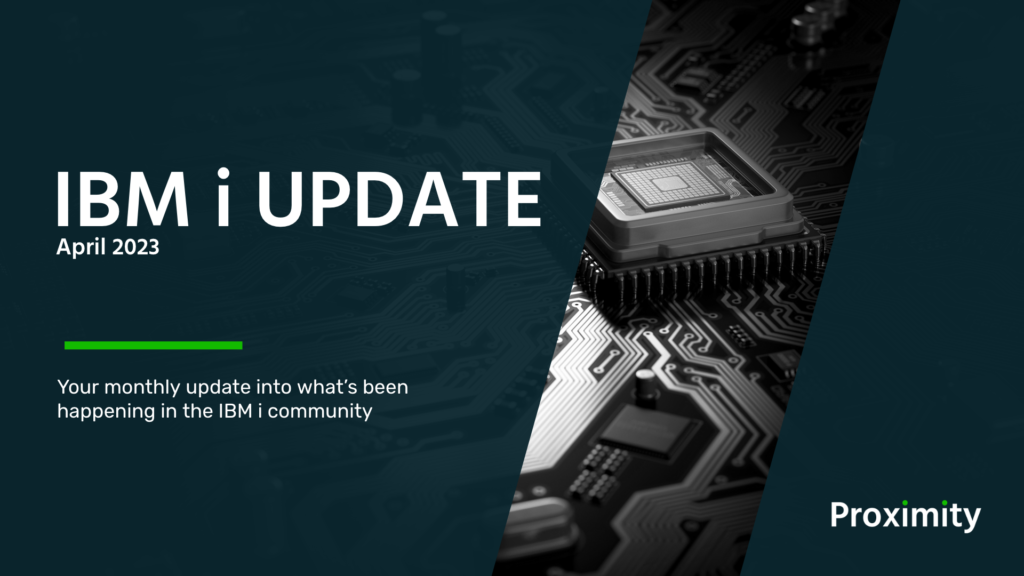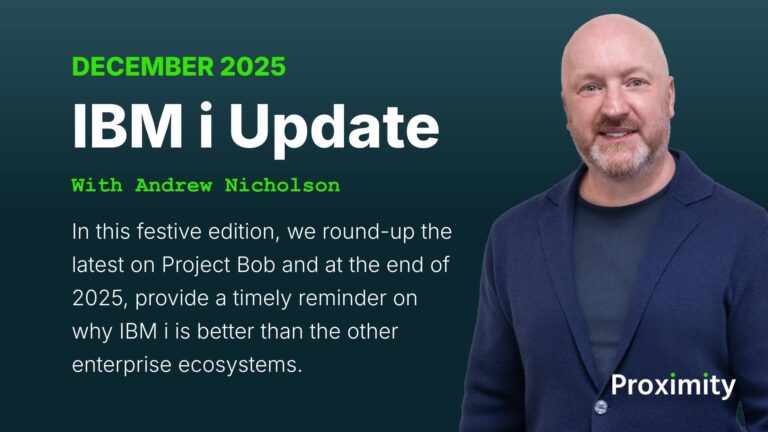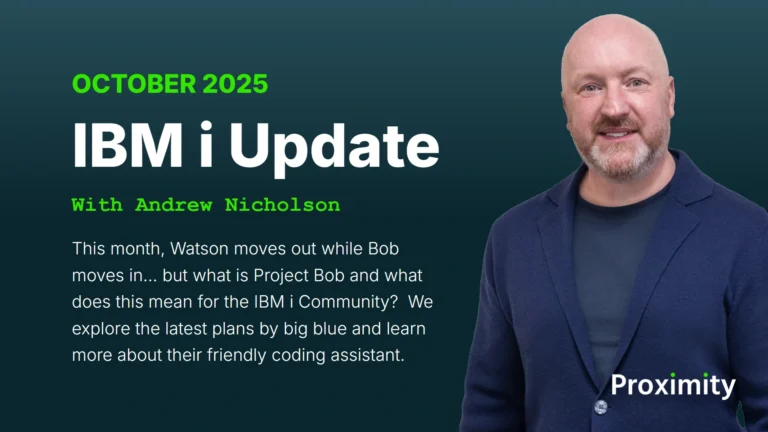Watch the Video:
Your #IBMi update for April 2023, delivered by Andy Nicholson: A snapshot of news and views on what’s been happening in the IBM i community in the past four weeks as reported by Proximity.
Or Read the Details:
Your #IBMi update – a snapshot of news and views on what’s been happening in the IBM i community in the past four weeks as reported by Proximity.
While last month, I spoke on the hot topics presented at conference, this month, I’ll talk about the top topic spoken in between sessions, over coffee – and that topic is ‘artificial intelligence’… namely chatGPT.
In this snapshot, we’ll discuss what it can do, its coding capabilities, how we can harness this and how it will change what we do.
First, a few facts.
In less that 5 months, ChatGPTs user base has grown exponentially, from 1 million users on its first day to 120 million in March.
It’s suggested that over 60% of requests made are in relation to code, mostly code generation to the extent at in just a few month, today more than 41% of all code of GitHub is now AI generated and while most of this is Python and PHP based… and yes, ChatGPT can produce code in RPG free and fixed too.
Indeed, earlier this year Roberto De Pedrini of FAQ400 asked the same and wondered how OpenAI could help support RPG development.
He asked ChatGPT to write him a simple ILE RPG program and results were fascinating…
Roberto was working on ChaptGPT 3.5 and described the technology as ‘FANTASTICO’.
He started by politely introducing himself and asked for help in writing a simple ILE program.
He then asks ChatGPT if it can create a program to reads from his customer table and create a list. Instantly, ChatGPT obliges and writes the RPG program for him.
Roberto didn’t say what his customer table was like and so, without direction, ChatGPT created the RPG in fixed. So, next, Roberto asked ChatGPT to change the parameters, switching to free format ILE. Again, ChatGPT complies and applies free format.. But not in its entirety… ChatGPT requires further direction and Roberto asks for full free ILE with the dcl-s specs.
Thankfully, ChatGPT doesn’t take offence, apologises and again fixes the code to produce full RPG ILE. Next Roberto explains that he prefers to use embedded SQL, not a problem, ChatGPT goes about modifying the code to apply the i/o to embedded SQL.
Checking the code, Roberto has a suggestion on its use of end-execs. ChatGPT agrees and again, updates the code accordingly. Roberto concluded that, with the right direction, ChatGPT can be an excellent tool to support development on IBM i.
A condensed video can be found within this blog while the full video can be found on his FAQ400 blog where he also has mixed results on a carbonara recipe.
Now, the astute amongst you will notice that Roberto is Italian and since the video was made, Italy has become the first Western country to block the use of ChatGPT over privacy fears.
In a statement which appears online to users with an Italian IP address who try to access ChatGPT, OpenAI writes that it “regrets” to inform users that it has disabled access to users in Italy — at the “request” of the data protection authority — which it known as the Garante.
Sam Altman, the CEO at OpenAI believes that ChatGPT does in fact adhere to GDPR and other privacy laws and hopes to have the the service up and running again in the near future.
But that’s not the only fear with this emerging technology.
An open letter from the ‘Future of Life Institute’ with signatories including Elon Musk, Steve wozniak and Andrew Yang have called on the the tech world to ‘pause’ development as unfettered development in this area comes with ‘catastrophic’ risks.
The concerned leaders call the rapid growth a “dangerous race,” and they’re asking labs to take a 6-month break to allow for further risk assessment on AI. The letter reads that ‘Advanced AI could represent a profound change in the history of life on Earth’
It goes on to question the role of AI in the workplace saying, ‘should we automate away all the jobs including the fulfilling ones?’
And finally, ‘Should we develop nonhuman minds that might eventually outnumber, outsmart, obsolete and replace us?’
So, is AI going to help or are we to be replaced? Well, with the correct safeguards in place, AI will be a game changing tool for the development community.
Imagine the role of a modern day coal miner.
What percentage of coal is mined with a pickaxe and shovel today?
It’s all done with machinery and heavy equipment but coal mining as a profession still exists.
While the machines have taken over the ‘heavy lifting’ there are still skilled engineers behind this, operating, managing and directing operations. It’s predicted that coding and a lot of other professional jobs will go the same way.
So, the heavy lifting will be produced by the AI, leaving more time for ‘imagination’ and ‘creative’ tasks such as detailed specifications, features, connections and the ‘directing’ of this data to create, test and improve code in shorter time frames.
And, indeed, this is the experience of a new generation of coders. I took time to speak with Rebecca Leigh, a recently qualified DevOps engineer who uses ChatGPT daily to help support her activities. I started by asking her how much time ChatGPT has saving her?
See the call in the video at the top of this blog!
Rebecca Leigh: Hours. I could happily spend a day or an afternoon trying to figure out an error. Looking on various stack, overflow websites to try and find someone who’s had the same issue as me, but with Chatgpt, it comes back with solutions, straight away. It just means I’m fixing things a lot quicker.
Andy Nicholson: Excellent. Have you found that using Chatgpt has helped you roll out more code more quickly?
Rebecca Leigh: I would definitely think so. A lot of the time. We’ve got alot of applications and obviously, with the newer ones, they’re requiring newer things that we possibly haven’t worked on before. So, being able to use chatgpt to help us define and get to the bottom of those areas, quicker. It’s really helping speed up our delivery on these.
Andy Nicholson: Do you see Chatgpt as a risk to your current position?
Rebecca Leigh: I don’t think so. Now if anything, it’s helping support my position. We’re getting through things a lot quicker, we’re able to sort our errors out a lot quicker and it means that we can develop better as a team. I don’t really see it as a risk, more of a helping tool.
My thanks to Rebecca for her time and valuable input. So, with all things considered, will ChatGPT help or hinder devops engineers on IBM i.
Well, AI can certainly help replace the boring, repetitive, tedious tasks that humans don’t want to do anyway… from researching, having to memorise locations, fields, parameters, paths and complex calculations – AI is certainly in a better position to complete this.
This frees up the engineer to do more thought-provoking and creative tasks. And as demonstrated by Roberto, these tasks need first need specification and on delivering to the AI, direction is all important.
So, much like the coal miner with more modern tools, AI will still require a human operator… but the use of these tools will accelerate the speed to complete tasks exponentially.
And the ramifications for future DevOps through using AI? Well, first, in higher education, the current focus on teaching is to memorise and test recall.
As these tasks will now be supported by AI, the focus should shift more towards creative thinking and vision forming.
Of course, humans will need to understand code, but their application in coding will be to test, sanitise and correct the code developed rather than build from scratch.
So, yes, there is a risk for low-level coders as DevOps will inevitably become a more creative – high level operation, with critical thinking for skilled engineers rather than simply task driven programming of which AI can do better.
But this won’t diminish the need for engineers, the requirement for this new high-level position will grow as they will play a crucial role in the design, development of new technologies and systems – shaping the enterprise and its inherent ability to adapt and grow.
I hope you’ve enjoyed this AI snapshot and I’m sure we’ll revisit the topic again in the near future.





